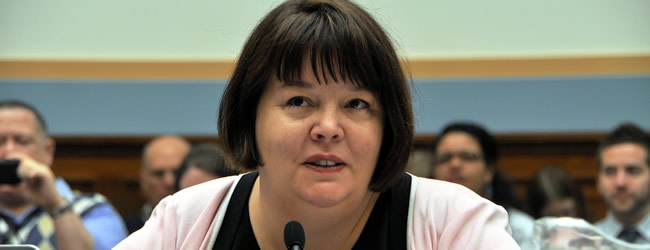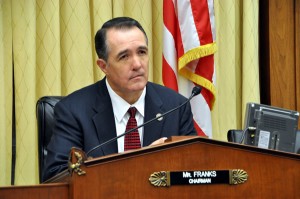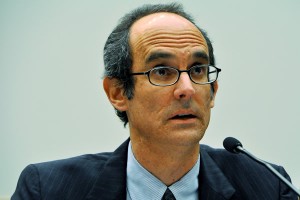Living
Tough questioning for Gallagher at marriage hearing
Democratic lawmakers hammer anti-gay activist

Democratic lawmakers on Friday hammered anti-gay activist Maggie Gallagher during a congressional hearing with questions on why same-sex couples should be excluded from marriage and the extent to which the National Organization for Marriage participated in campaigns to rescind state marriage laws.
In testimony before the House Judiciary subcommittee on the Constitution, Gallagher, NOM’s chair and co-founder, said marriage should restricted to one man and one woman because such unions are the only kind that can produce children and because state voters by referenda have affirmed 31 times that marriage shouldn’t be extended to gay couples.
“Marriage is the union of husband and wife for a reason: these are the only unions that create new life and connect those children in love to their mother and father,” Gallagher said. “This is not necessarily the reason why individuals marry; this is the great reason, the public reason why government gets involved in the first place.”
The hearing, which was titled “Defending Marriage,” took place on the heels of President Obama’s announcement on Feb. 23 that the Defense of Marriage Act is unconstitutional and that his administration would no longer defend the anti-gay law against litigation in court. Following a 3-2 party-line vote in March by the Bipartisan Legal Advisory Council, U.S. House Speaker John Boehner (R-Ohio) directed the House general counsel to take up defense of DOMA in place of the administration.
Gallagher said the need to raise children by married parents of opposite genders affirms the rationale for having in place DOMA, the 1996 law that prohibits recognition of same-sex marriage, and criticized the Justice Department for dropping defense of the law.
“This is the rationale for the national definition of marriage proposed by Congress in passing DOMA: ‘civil society has an interest in maintaining and protecting the institution of heterosexual marriage because it has a deep and abiding interest in encouraging responsible procreation and child-rearing,'” Gallagher said. “If we accept, as DOMA explicitly does, that this is a core public purpose of marriage, then treating same-sex unions as marriage makes little sense.”
Following her opening statement, Gallagher bore the brunt of tough questioning from Democratic lawmakers during the question-and-answer session of the hearing.
Rep. Jerrold Nadler (D-N.Y.), ranking Democrat on the subcommittee, asked Gallagher if the children of Jen and Dawn BarbouRouske, a married same-sex couple from Iowa who were present during the hearing, should have parents who can receive the full protections of marriage or if she considers these children “expendable.”
“I think no children are expendable,” Gallagher replied. “Gay people have families that are not marital families, but they are families. I myself was an unwed mother, so I have firsthand experience with being in a family that’s not a marital family. I don’t think you need to have a message of stigmatization and exclusion to protect to an ideal.”
Nadler, sponsor of DOMA repeal legislation in the House, interrupted Gallagher, saying “the whole point” of DOMA is stigmatization and exclusion, and pressed Gallagher further on why the institution of marriage benefits when same-sex couples are excluded.
“Because including same-sex unions as marriages denies at a public level that marriage is about an important way for getting together mothers and fathers and children,” Gallagher said.
Nadler continued to question Gallagher on NOM’s involvement in 2010 Iowa campaign that successfully ousted three justices from the state Supreme Court who ruled in favor of same-sex marriage. The lawmaker asked Gallagher, who estimated that NOM contributed between $600,000 and $650,000 to the campaign, why she would criticize the Justice Department for allegedly making a political decision while her organization politicized the judicial process.
“The National Organization of Marriage is political advocacy organization, and so I think it’s appropriate for us to be politically involved in ways that Department of Justice is not,” Gallagher replied.
Rep. John Conyers (D-Mich.), a co-sponsor of the DOMA repeal bill, asked Gallagher whether reports were true that her organization contributed $1.9 million to the 2009 campaign in Maine to abrogate the states’s same-sex marriage law. Opponents of same-sex marriage succeeded in nullifying the marriage law in the state before gay couples could marry there.
“I don’t have those figures in front of me, but we were involved in the [effort],” Gallagher said. “But that’s probably on the order [of our contributions].”
NOM has repeatedly come under fire for failing to disclose their donors during the campaign against the Maine marriage law. State courts have ordered the organization to reveal their donors in accordance with the law, but NOM has yet to do so.
Following the hearing, Dan Fotou, eastern regional field director for GetEQUAL, praised Democratic lawmakers for hammering Gallagher with tough questions after her testimony.
“I think it was good to hear the Democrats standing up and challenging Maggie Gallagher’s position,” Fotou said. “Fifty-two percent of Americans think that marriage equality is OK, so I think today was good in terms of putting a face on hate once again, and Maggie does a really great job of that.”
Democratic lawmakers’ criticisms during the hearing weren’t limited to Gallagher. Conyers questioned Rep. Trent Franks (R-Ariz.), chair of the subcommittee, why no witnesses from the Justice Department were present to defend Obama’s decision to drop defense of DOMA.
“What bothers me about this hearing at this subcommittee is that the Department of Justice is not present,” Conyers said. “I was informed that they were not invited. … We have one of the leaders of the country, Ms. Gallagher, who’s raised hundreds of thousands of dollars against judges … but there’s nobody here from the Justice Department.”
In response, Franks said the Justice Department would be invited to come during an upcoming hearing in May before the House Oversight & Government Reform Committee on the DOMA decision. Upon further questioning, Franks maintained the panel was fair because its makeup included witnesses on both sides of the issue.
But Franks’ response apparently didn’t allay the concerns of Conyers, who said he hopes Congress can hear the Justice Department to respond to the criticisms of Gallagher.
“There’s a political tone in this hearing that I want to diminish as much as possible,” Conyers said. “The fact of the matter is this is not in regular order and I do not approve the way that we’re starting out this subcommittee [hearing].”
Despite the general tone in favor of DOMA during the hearing, several panel members known for having anti-gay views — including Rep. Steve King (R-Iowa), who’s railed against same-sex marriage in home state, and Rep. Jim Jordan (R-Ohio), who’s leading the effort to eliminate gay nuptials in D.C. — didn’t make an appearance. Neither the office for King nor Jordan responded to the Washington Blade’s request to comment on why the lawmakers didn’t attend the hearing.
Ian Thompson, who’s gay and legislative representative for the American Civil Liberties Union, said the lack of presence by anti-gay lawmakers was telling that the they were uncomfortable with their positions.
“The thing that was particularly striking to me was the fact that so few DOMA supporters on the committee actually were in attendance,” Thompson said. “So, from my perspective, if the hearing was intended to demonstrate the support of the House of Representatives for DOMA, from the attendance alone, it was a complete and total flop.”
But a few anti-gay Republicans did make an appearance to rebuke the notion of extending marriage rights to gay couples and to criticize the Justice Department for dropping defense of DOMA.
Franks called Obama’s decision to discontinue defense of the anti-gay law an “edict” that “failed to show the caution and respect for Congress and the courts.”
“When the President unilaterally declares a duly enacted law unconstitutional, he cuts Congress and the American people out of the lawmaking process,” Franks said. “Such heavy-handed presidential action undermines the separation of powers and the principle that America is a constitutional republic predicated on the rule of law.”
Franks continued that the arguments in favor of DOMA are “reasonable and right” because marriage between one man and one woman is the best union for raising children.
“Traditional marriage has proven to be the most successful institution in humanity’s history for the propagation and preparation of the next generation,” Franks said. “The traditional family has proven to be the best department of welfare, the best department of education, the best department of crime prevention, and the best department of economic security that there has ever been.”
Rep. Lamar Smith (R-Texas), a lawmaker known for anti-gay views, also made an appearance at the hearing and railed against what he called the government altering the definition of marriage. Smith, chair of the full House Judiciary Committee, offered an opening statement during the hearing even though he’s not a member of the subcommittee.
“If we tamper with the definition of marriage, harmful unintended consequences could follow,” Smith said. “The ability of religious institutions to define marriage for themselves to promote their sincerely held beliefs could be threatened.”
Smith said the will the people is for continued definition of marriage between one man and one woman — noting the 31 successful ballot initiatives that restricted marriage to such unions — and said the U.S. Constitution doesn’t provide protections for same-sex couples seeking to marry.
“No one can seriously believe that the Constitution’s founders intended to create a right to same-sex marriage,” Smith said. “By refusing to defend the Defense of Marriage Act against legal challenges, the administration has allowed the courts to overrule that popular law.”
Franks and Smith’s opening statements were countered by initial remarks from Nadler, who called arguments that Justice Department acted inappropriately by dropping defense of DOMA a “red herring” and said the real question should be whether anyone — either the Obama administration or Congress — should defend the law.
“Far from demeaning, trivializing or destroying the institution of marriage, [gay] couples have embraced this time-honored tradition and the commitment and serious legal duties of marriage,” Nadler said. “Rather than defending DOMA in court, Congress should be working to repeal it.”
Two legal experts on the panel presented opposing views on whether the administration acted within bounds in its decision to discontinue defense of DOMA in court.
Edward Whelan, president of the Ethics & Public Policy Center, said the Justice Department’s decision is in violation of its policy.
“The Obama administration’s decision to abandon defense of DOMA — or more precisely, to abandon its charade of pretending to defend DOMA — departs sharply from the Department of Justice’s long-standing practice,” Whelan said.
Whelan said Obama dropped defense of the anti-gay law to appease a political constituency and to induce the courts to “invent the constitutional right to same-sex marriage.”
“With the exception of laws that intrude on the executive branch’s power, the long-standing practice of the Department of Justice is to vigorously defend the constitutionality of any law where a reasonable may be made,” Whelan said. “This ‘reasonable standard’ is a very low bar. It basically means that the Department of Justice will defend a federal law against constitutional challenge when it can offer non-frivolous grounds in support of the law.”
But Carlos Ball, a gay law professor from Rutgers Law School, testified that Obama acted within his authority because another statute exists saying that the attorney general must inform Congress if the administration decides to no longer defend a law.
“The existence of that statute seems to be a recognition by the Congress of the reality that the executive branch sometimes, in rare cases, can not defend the constitutionality of a law,” Ball said. “The executive branch, as a co-equal branch of government, has the authority and obligation to make independent assessment’s regarding a law’s constitutionality.”
Ball noted precedent for an administration declaring an existing law unconstitutional and dropping defense of the statute in court — the 1990 case of Metro Broadcasting v. FCC. Then-acting U.S. Solicitor General John Roberts, now Chief Justice of the U.S. Supreme Court, argued that a law providing for minority preferences in broadcast licensing was unconstitutional. Despite the position of the Bush administration, the Supreme Court later upheld the law.
Real Estate
Navigating DMV real estate market during political unrest
Reductions in federal employment have introduced uncertainties

The Washington, D.C.-Maryland-Virginia (DMV) region has long been recognized for its robust housing market, underpinned by the presence of the federal government and a diverse economic landscape. Recent massive reductions in federal employment have introduced uncertainties, yet the area continues to offer compelling reasons for prospective homebuyers, particularly within diverse communities.
While the federal government has traditionally been a significant employer in the DMV, the region has proactively diversified its economic base. Sectors such as technology, professional services, education, and healthcare have expanded, mitigating the impact of federal job cuts. This diversification fosters some economic resilience, which offers our area a semblance of protection against the impending unknowns that we currently face. Nothing can shield real estate entirely; however, our area tends to survive these types of changes better than other parts of the country.
Despite concerns over federal layoffs, the DMV housing market has demonstrated notable stability. Analyses indicate that the number of active listings, sold properties, and median sales prices have remained steady on a year-over-year basis. This steadiness suggests that the market is adapting to changes without significant disruption.
Furthermore, while there has been a slight increase in home listings, this trend aligns with typical seasonal variations and does not solely reflect federal employment changes. The luxury property segment, in particular, continues to thrive, indicating sustained interest and investment in the region.
The DMV region is renowned for its cultural and demographic diversity, with areas like Montgomery County, Md., being among the most ethnically diverse in the nation. This inclusivity extends to various communities, including LGBTQ individuals, fostering a welcoming environment that enhances the area’s appeal. Even though the current administration is fostering anti-diversity ideology, I remain confident that our LGBTQ community will continue to thrive even as these destructive forces work against us.
Local governments within the DMV have implemented policies aimed at promoting affordable housing and preventing displacement, particularly in the wake of economic shifts. Initiatives like the Douglass Community Land Trust in Washington, D.C., exemplify efforts to maintain housing affordability and support community stability.
Additionally, jurisdictions such as Montgomery County have longstanding Moderately Priced Dwelling Unit (MPDU) programs that require developers to include affordable housing in new residential developments. These policies contribute to socioeconomically mixed neighborhoods, benefiting diverse populations.
Despite Elon Musk’s brandishing of a chainsaw to the federal workforce, our real estate market continues to thrive. The DMV region maintains its appeal. Economic diversification, market stability, commitment to diversity and inclusion, and progressive housing policies collectively contribute to an environment that supports and attracts diverse communities. Prospective homebuyers can find reassurance in the region’s resilience and ongoing efforts to foster an inclusive and vibrant community. These are only a few among the many reasons to have a positive outlook while considering real estate options in our area.
It is important to consider working with brokerages, brokers, agents, lenders and title companies who align with our community and our objectives. Not all LGBTQ agents work for brokerages that support or understand the needs of the members of our community. Do your research and find out who has donated money to what political causes. Now more than ever we must support members of our community to protect our way of life and our very existence.
Stacey Williams-Zeiger is president/principal broker of Zeiger Realty Inc. Reach her at [email protected].

Hi Michael,
When I came to D.C. for college and came out, I was idealistic about finding true love. I made gay friends at school and watched them hooking up all the time.
It seemed like the opposite of what I wanted. I dreamed of meeting “Prince Charming” and living happily ever after. I thought I would put off sex until I met my special guy.
This went on for a while until I got too horny and impatient to keep putting off sex. The boyfriend wasn’t materializing so I went online and hooked up. Actually it was a lot of fun.
Soon I was hooking up as much as any of my friends were. I kept hoping I’d still find my prince. But over time most of my energy shifted to finding guys to have sex with.
Now I’m 34. I’ve been at this a long time and I realized the other day that I don’t like my life.
I haven’t been on a real date in years but I’m hooking up multiple times a week. I’ve been with almost everyone I see on the apps whom I find attractive (where the feeling was mutual). And yes, I’ve been with a lot whom I didn’t find attractive because I was horny.
I look at myself and I think, yuk. I don’t like whom I’ve become.
I feel like I am addicted to hooking up. I just keep craving something. The release but mostly the attention, that the other person finds me hot. After I come, I feel like the whole thing was pointless, and a little disgusted with myself. Advice?
Michael replies:
You’re using hookups not just for sex, but as a way to feel good about yourself by getting positive attention from others.
But other-validation is like junk food, a sugary snack that staves off hunger for a few minutes and never really fills you up. All those guys you hook up with? The attention feels great, but as you wrote, that feeling lasts until your orgasm. And then you’re back to chasing it.
As with junk food, the other-validation you get when you hook up is a lot of empty calories. Having someone you don’t even know agree to have sex with you says nothing meaningful about your worth or even your attractiveness.
Yet another problem: If you believe that you need other-validation, you will do all sorts of self-damaging behaviors to get it—such as hookups that leave you feeling empty and disgusted. I’ve seen many people lose their self-respect in the service of getting other people’s positive attention through behaviors that violate their own integrity. Doing things that make you feel bad about yourself in an attempt to feel good about yourself is ironic, and sad.
The bottom line is that other people can’t “make” you feel good about yourself. They might give you a small temporary boost, but your self-esteem actually has to come from you. That’s why it’s called self-esteem. Once you are past a certain age, if you don’t believe that you have value, no one else can get you there. You have to validate yourself.
Let’s go big-picture for a moment: It is our parents’ job to teach us that we have value when we are little, and when that doesn’t happen, we often struggle with self-esteem throughout our lives, unless we can find a path to develop our own belief in our worth. In the meantime, we may chase other-validation in a futile attempt to fill ourselves up.
Other experiences we go through—for example, growing up gay in a hostile environment—can also do a number on how we see ourselves, and leave us grasping for affirmation from others. It takes work to get through and get past the impact of these experiences.
So how do you get better at giving yourself the validation you are seeking? There’s a great saying from the 12-step programs: If you want to have self-esteem, behave in esteemable ways.
What would it mean for you to behave in a way that you respect? Your letter provides one answer that is true for you: Stop engaging in sexual encounters that leave you disliking yourself.
Far easier said than done, right? But that doesn’t mean it’s impossible. Having gotten clarity that you don’t like the life you’ve constructed for yourself, now you actually can do something about it. Keep in mind, though, that you will face some challenges if you stop hooking up.
First: You may find it isolating and scary to stop doing something that all or most of your friends are doing. You will have to reassure yourself that you’re doing what’s right for you; that you are taking good care of yourself by choosing to avoid behaviors that leave you feeling bad; and that it’s OK to be different from “everyone else.” In other words, you are going to have to get much better at self-validation.
If you have some friends who don’t spend a lot of their time hooking up, they may be good supports for you. Some guys find camaraderie from attending a 12-step program like Sexual Compulsives Anonymous (SCA).
Second: People often use hookups (and sex) not just for sexual gratification, but to soothe anxiety, stress, depression, and other uncomfortable feelings. If you stop hooking up, you will likely need some other ways to keep yourself calm and to steady your mood. Exercise and meditation are two obvious means.
You’d be wise to figure out new ways to fill your time that give you a sense of meaning and connection. I can’t tell you what those might be; only you can figure out what is right for you. They might include developing or deepening warm friendships, taking good care of yourself, finding a new activity that interests you — the list can go on and on.
If you still want to find your prince, this is the way to go about it. The cliché is true: You can’t expect anyone to like you unless you like yourself. If you build a life rich in fulfilling pursuits that help you to feel good about who you are and the life you are leading, you will be transforming yourself into relationship material.
Keep in mind, though, that letting yourself get close to someone through a heart connection would mean having to confront all sorts of uncomfortable emotions, including feeling vulnerable, that you have avoided by limiting yourself to crotch attachments.
That said, working to become a more solid person would help you develop the strength to tolerate the ongoing challenges of a close relationship.
Michael Radkowsky, Psy.D. is a licensed psychologist who works with couples and individuals in D.C. He can be found online at michaelradkowsky.com. All identifying information has been changed for reasons of confidentiality. Have a question? Send it to [email protected].

Whether you are upgrading parts of your current home to prepare it for sale or enhancing the home you just purchased, kitchens and bathrooms are still at the top of the renovation list.
Kitchen renovations have always embraced a blend of functionality, personalization, and aesthetic appeal; however, homeowners are currently moving away from sterile, uniform designs, opting instead for spaces that reflect warmth, character, and individual style. Here are some of the most prominent trends shaping kitchen renovations this year.
Warm and Earthy Tones
The dominance of all-white kitchens is waning as homeowners gravitate toward warmer, earth-toned palettes. Shades like sage green, navy blue, and natural wood finishes are becoming popular choices for cabinetry, infusing kitchens with a cozy and inviting atmosphere. This shift reflects a desire for spaces that feel more personalized and less clinical. Flat panel and Shaker cabinets continue to be popular options.
Integration of Organic Modernism
The “modern organic” style is gaining traction, characterized by using natural materials, neutral color palettes, and serene layouts. Incorporating elements like soapstone countertops, Venetian plaster walls, slate floors, and greenery not only enhances aesthetic appeal but can also increase home values significantly. Fully outfitted outdoor kitchens further contribute to this trend.
Innovative Kitchen Island Designs
Kitchen islands continue to be central features, with designs evolving to incorporate textures, wood and tile cladding, multifunctional elements, and bold colors and materials. Integrated seating areas, waterfall countertops, and the use of monolithic stone or stacked marble are becoming increasingly popular. These islands not only serve as functional workspaces but also as striking focal points within the kitchen.
Concealed Kitchens for a Sleek Look
The concept of concealed kitchens is on the rise, emphasizing built-in appliances, flush cabinetry, and appliance garages to maintain a clutter-free environment. This design approach fosters a minimalist aesthetic, creating a seamless flow between the kitchen and adjacent living areas, particularly in open-concept homes.
Personalized Cabinetry and Storage Solutions
Customization is key in modern kitchen designs, with homeowners seeking tailored storage solutions that cater to their specific needs. Features like hidden storage compartments, integrated lighting, and unique hardware choices are being favored over generic, cookie-cutter options. This trend underscores a move toward kitchens that are both functional and reflective of personal style.
Revival of Traditional Styles with Modern Twists
Traditional kitchen styles are making a comeback, with a contemporary twist. Elements such as expanded backsplash coverage, classic tile shapes and patterns, use of mixed metals, and specialty appliances are being integrated into modern kitchens, blending the charm of the past with the conveniences of the present. Custom range hoods, coffee bars and microwave drawers are increasingly added to renovation projects. This fusion creates spaces that are both timeless and equipped for modern living.
Sustainable and Natural Materials
Sustainability remains a priority, with an increased use of eco-friendly materials like reclaimed wood, recycled metals and glass, and energy-efficient appliances. This not only reduces environmental impact but also introduces unique texture and shimmer into kitchen designs, adding depth and character to the space.
Use of Bold Colors and Accents
Homeowners are becoming more adventurous with color and texture, incorporating vibrant hues and tactile materials into their kitchen designs. Features like colorful window trims, two-tone cabinets, and the use of wallpaper and feature walls add visual interest and a personalized touch to the space. In addition to the familiar white, major appliances are now shown in matte black, navy, and jewel tones of red, green, and blue. There are even vinyl wraps and magnet covers that allow for more creativity and individualization with appliances.
Integration of Smart Technology
The incorporation of smart technology continues to grow, with appliances featuring automated cooking functions, sensor reheating, and control locks becoming more prevalent. Induction stoves are entering the mix. Charging stations and touch-activated cabinet doors and faucets are also popular. LED lighting lasts longer and prevents you from having to climb a ladder to change lightbulbs on a high or vaulted ceiling. These advancements enhance convenience and efficiency, aligning with the modern homeowner’s desire for a kitchen that supports a tech-savvy and busy lifestyle.
Multifunctional Spaces
Kitchens are increasingly being designed as multifunctional spaces that accommodate cooking, dining, working, and socializing. This has led to the inclusion of features like integrated seating, versatile lighting, and adaptable layouts that can easily transition between different uses, reflecting the evolving role of the kitchen in contemporary homes. Still, don’t be surprised to see a resurgence of self-contained kitchens with real walls.
So, whether the kitchen you want is sleek and modern, earthy and organic, or traditional and elegant, there will always be fresh new styles, ideas, innovations and classic touches that cater to your lifestyle.
Valerie M. Blake is a licensed Associate Broker in D.C., Maryland, and Virginia with RLAH @properties. Call or text her at 202-246-8602, email her via DCHomeQuest.com, or follow her on Facebook at TheRealst8ofAffairs.
-

 The White House5 days ago
The White House5 days agoWhite House does not ‘respond’ to reporters’ requests with pronouns included
-

 District of Columbia2 days ago
District of Columbia2 days agoReenactment of 1965 gay rights protest at White House set for April 17
-

 Hungary2 days ago
Hungary2 days agoHungarian MPs amend constitution to ban public LGBTQ events
-

 Maryland2 days ago
Maryland2 days agoFreeState Justice: Transgender activist ‘hijacked’ Moore’s Transgender Day of Visibility event















